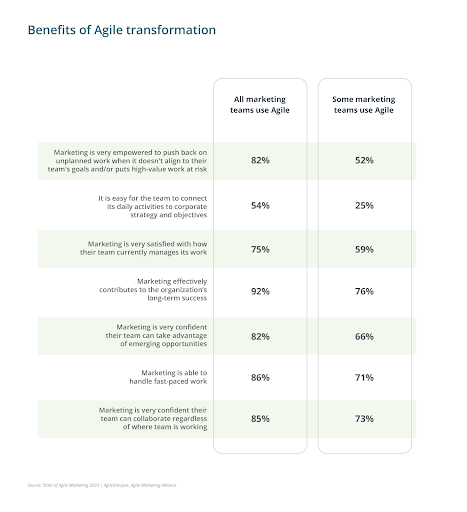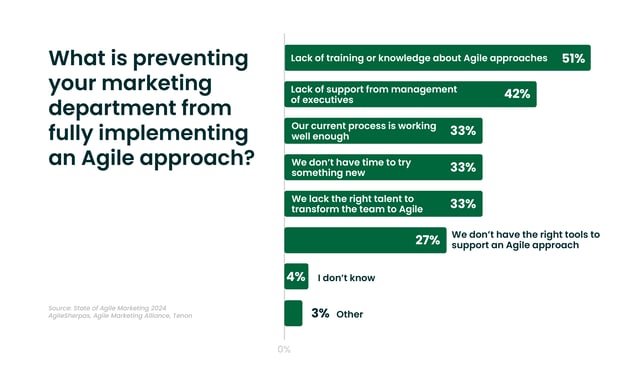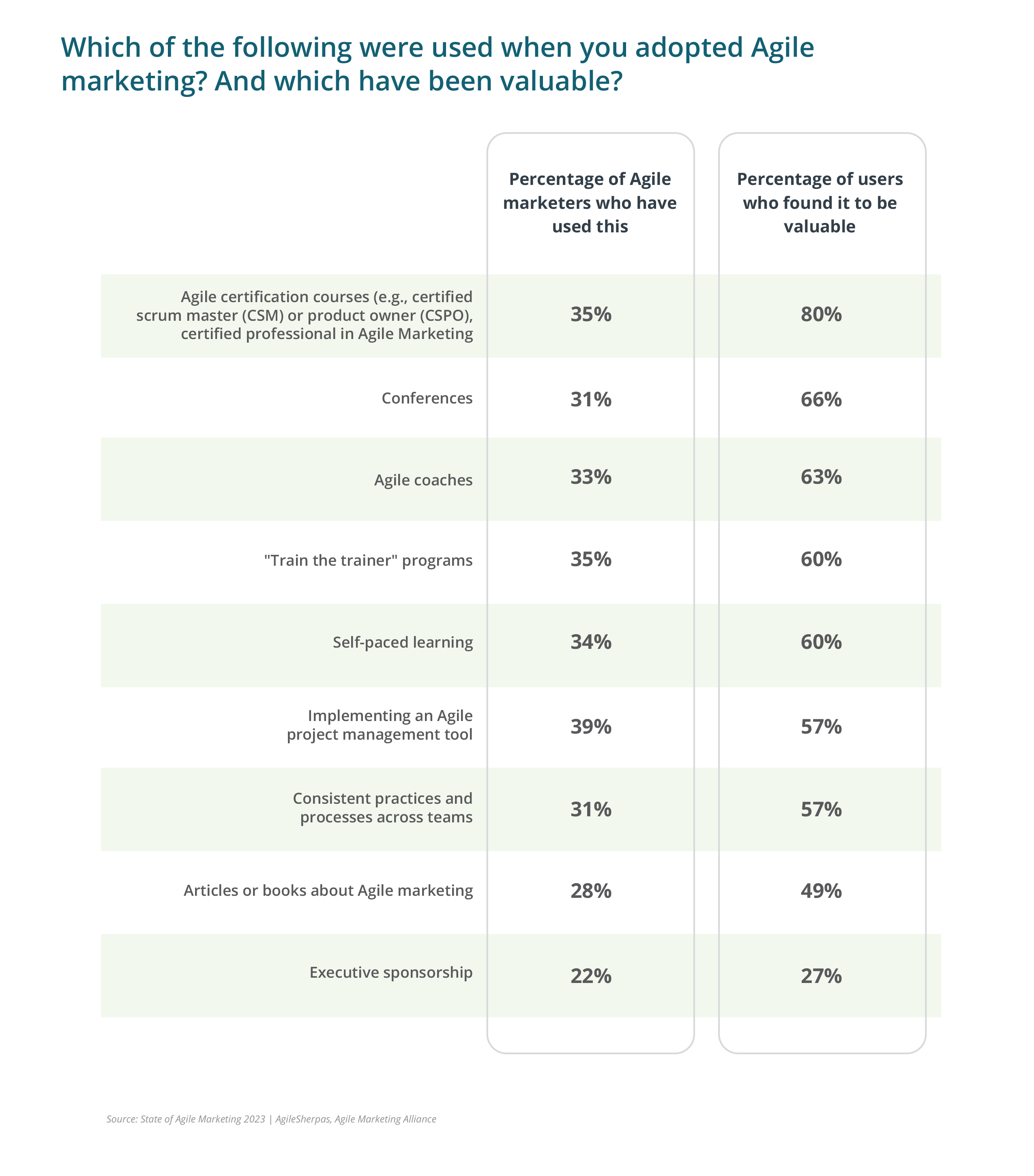-
- marketing agility
- Teams
- Organizations
- Education
- enterprise
- Articles
- Individuals
- Transformation
- Solution
- Leadership
- Getting Started
- business agility
- agile management
- going agile
- Frameworks
- agile mindset
- Agile Marketing Tools
- agile marketing journey
- organizational alignment
- Agile Marketers
- People
- Selection
- (Featured Posts)
- strategy
- agile journey
- Kanban
- Metrics and Data
- Resources
- Why Agile Marketing
- agile project management
- self-managing team
- Meetings
- Scrum
- agile adoption
- scaled agile marketing
- tactics
- scaled agile
- AI
- Agile Leadership
- Agile Meetings
- agile marketing training
- agile takeaways
- enterprise marketing agility
- agile coach
- Scrumban
- agile marketing planning
- state of agile marketing
- team empowerment
- Intermediate
- agile marketing mindset
- agile plan
- Individual
- Team
- Videos
- agile marketing
- agile transformation
- kanban board
- Agile Marketing Terms
- traditional marketing
- Agile Marketing Glossary
- FAQ
- agile marketing methodologies
- agile teams
- Agile Marketing Teams
- CoE
- Scrumban
- agile
- agile marketer
- agile marketing case study
- agile marketing coaching
- agile marketing leaders
- agile marketing metrics
- agile pilot
- agile sales
- agile team
- agile work breakdown
- cycle time
- employee satisfaction
- marketing value stream
- marketing-analytics
- remote teams
- sprints
- throughput
- work breakdown structure
- News
- agile brand
- agile marketing books
- agile marketing pilot
- agile marketing transformation
- agile review process
- agile team charter
- cost of delay
- hybrid framework
- pdca
- remote working
- scrum master
- stable agile teams
- stand ups
- startups
- team charter
- team morale
- user story
- value stream mapping
- visual workflow

Agile has gained wide popularity in traditional and digital marketing for a reason. The benefits and flexibility that the methodology offers are every marketer’s dream of successful campaigns and organized processes.
All that popularity also means there’s a ton of information about Agile transformation out there. However, it can be extremely difficult, even exhausting, to separate the high-quality information from the less-than-useful stuff. That’s why we’ve put together this list of real lessons from real experience.
Below, our Sherpas shared the 5 most important things they learned about Agile digital marketing from their decades of experience coaching and training teams in this space.
Agile and Digital Marketing are a Match Made in Heaven
The foremost lesson we learned from the past years is that the efficiency and productivity Agile promotes make it great for digital marketing teams. Traditional management and planning of Big Bang digital campaigns don’t cut it anymore, not in the volatile, fast-paced digital world we live in today.
Digital marketing moves faster than traditional marketing, so the ability to quickly shift priorities and respond to new circumstances is extremely important. Agile is especially beneficial for digital marketing because it allows teams to have speed, efficiency, and visibility into the marketing process.
We’ve found these elements absolutely essential, as they allow teams we’ve worked with to quickly respond to client feedback, keep clients in the loop about what’s happening, and generally produce more impactful content, campaigns, etc. in less time.
Now that Agile has gained more popularity and credibility as an approach to managing work, digital marketers feel even more encouraged to implement it in their organizations.
In fact, 40% of respondents from this year’s 7th State of Agile Marketing Report indicated Agile is on their schedule and planned to begin their transformation to this new way of working soon enough.
This number is significantly higher for marketing organizations that have experienced the power of Agile marketing already. To be more precise, 61% of organizations planned to transition some of their remaining teams to Agile ways of working, and another 25% intended to transform all of their teams in 2024.

But before rushing to implement Agile digital marketing in your organization, know that your chances of success are significantly higher when you revisit the structure of your teams, embrace the Agile mindset, and receive strong executive support.
Digital marketers have rushed to adopt the Agile ways of working for good reasons. Over the years, they’ve reported that Agile allows them to manage their priorities better, have improved visibility into project status, improve team productivity and morale, and work more efficiently in general.

The numbers really speak for themselves as the number of marketers who feel confident that their work is important and that they can have a real impact increases dramatically with greater use of Agile ways of working.
Done right, Agile marketing can ensure these and many more unexpected advantages that can make marketers’ processes easier and quicker.
Agile Digital Marketing Requires Training & Coaching In Combination
Our experience has shown that even seasoned digital marketers with some background in Lean and Agile work need training and coaching to fully adapt the way their entire teams are working. Unfortunately, many skip this important step. In fact, the biggest obstacle in the way of marketers trying to become more Agile, aside from not wanting to change the status quo, is a lack of training and knowledge. That trend has remained consistent year over year, according to our research.
This often leads to situations where, for example, digital marketers start using a Kanban board and assume they are now fully Agile. Training is what equips marketers with the tools to adjust Agile to meet their needs while avoiding “fake Agile” which sees them going through the motions without gaining the benefits.
However, training alone is not enough. Digital marketers who just got introduced to Agile need practical experience, coaching, and a mindset shift for things to work out in their favor.

While this barrier does continue to exist through the years, more and more resources are becoming available to overcome it. Dozens of books, case studies, podcasts, webinars, and, of course, certifications are now available on Agile digital marketing.
These resources are frequently utilized during an Agile digital marketing transformation and generally produce positive results. 70% of marketers who have taken Agile certification found them useful, though only 34% actually use them. For self-paced learning, 53% found the learning to be useful.

The 70-20-10 Model
Of course, relying too much on training and coaching alone can produce its own problems, so it’s important to get the right balance of training, coaching and on-the-job experience. We’re particular fans of a learning development approach called 70-20-10 that makes sure newly acquired information from training is successfully retained and sustainably incorporated throughout the team.
It’s based on the idea that learning comes from a combination of 70% practical experience, 20% on-the-job mentoring, and just 10% structured learning.

This learning model is able to support digital marketing teams throughout their learning journeys. It does this by sharing awareness of Agile theory, building momentum through effective coaching, and successfully integrating Agile principles and values into their specific marketing contexts. So, for example, our team members handling digital ads don’t necessarily use Agile in precisely the same way that our writers do. But we do share the same principles and use tools like Kanban boards to collaborate more effectively.
Before learning about the Agile mindset, why don't you take a second to get our Agile Marketing Transformation Checklist?
Agile Mindset is the Key
One of the most important lessons we make sure organizations and teams understand is that an Agile transformation won’t happen overnight and changing traditional mindsets to Agile needs time to truly become ingrained in the modus operandi of organizations.
Based on their years of training teams, our coaches say that one of the most underappreciated, yet crucial, elements to making agility happen at all levels is the Agile mindset itself and how it is reflected in the everyday organizational culture. Without it, backsliding is likely as the effort and resources poured into your Agile transformation are wasted and people revert to their old ways.
But when an Agile mindset is firmly established, teams are able to experiment, test, learn, respond based on data, and always keep the client at the center of everything when they approach their job with the Agile principles and values in mind.
This is particularly true when digital marketing teams are working on tight deadlines, as pressure often leads to team members reverting to non-Agile ways of working. But by emphasizing mindset first, we’ve been able to avoid those problems over the years.
Do Just Enough
We’ve observed a factor that, despite being a critical one in the long run for the success of the team, simply doesn't get enough attention. One of the key drivers of marketing agility and prioritization is "doing ‘just enough’ to achieve the value that's needed right now."
Agile teams work smarter, not harder, by concentrating on providing value rather than producing "perfect" polished products. Whether we’re designing a landing page, creating an email newsletter, or writing this article, we’re always trying to balance effort with value to ensure we’re doing the most we can without succumbing to the stress and strain that causes burnout.
This is a particular danger with digital marketing, where it’s easy to get sucked into endless optimizations. It’s important to realize that spending 5 hours to get a tiny improvement that might not ultimately impact the ROI of a campaign might not actually be worth it.
Little Happens Without Leadership Support
Leadership support is one of the factors that has the power to make or break an Agile digital marketing team's progress. In this year's Agile Marketing Report, we noticed that Agile marketers still struggle with unplanned work, but this year's difficulty was eclipsed by people's propensity to return to their non-Agile comfort zones.
We’ve seen this play out in digital teams where, even though the team itself managed to get into a good Agile rhythm, if their clients or leaders still treat them as they did before, it can put that system under incredible strain.
That’s why leadership support is crucial over the course of an Agile transformation.
Digital marketing leaders must be prepared to support their people through navigating stakeholders, incoming request, and a new, evolving process if they want to reap the benefits of Agile ways of working for years to come.
We’re lucky that, being an Agile organization ourselves, leadership support is something of a given. But that doesn’t mean we take it for granted. Regular check-ins with leaders are still an important part of how we plan, respond to challenges, manage expectations and negotiate deadlines on a day-to-day basis.
Is Agile Digital Marketing One of Your New Year's Resolutions?
If you're a digital marketing team or organization undertaking an Agile transformation, the headings in this article can serve as a transformation checklist to help you navigate your Agile journey.
Do we have leadership support?
Do we have a "do just enough" mindset?
Are we trained in Agile?
Do we have access to coaching support if we need it?
Do we approach even tight deadlines with an Agile mindset or revert to traditional modes?
If you've answered YES to all of these questions, then you're a digital marketing team that is well-positioned to reap the full benefits of an Agile way of working. If there's room for improvement and you feel that you could be doing more, feel encouraged to check out our online courses on Agile in marketing below or get in touch with a Sherpa.
Also, don't forget to download our Agile Marketing Transformation Checklist before you leave.
Topics discussed
Improve your Marketing Ops every week
Subscribe to our blog to get insights sent directly to your inbox.



